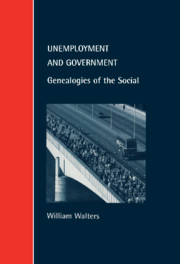Book contents
- Frontmatter
- Contents
- Acknowledgements
- Introduction
- 1 The Discovery of Unemployment
- 2 Inventing Unemployment: The Birth of the Labour Exchange
- 3 Governing Unemployment as a ‘Risk’
- 4 Governing Through the Long-Term Unemployed: Unemployment Between the Wars
- 5 Unemployment and its Spaces
- 6 Governing Divided Societies: The New Deal
- Conclusion
- Notes
- Index
Introduction
Published online by Cambridge University Press: 07 September 2010
- Frontmatter
- Contents
- Acknowledgements
- Introduction
- 1 The Discovery of Unemployment
- 2 Inventing Unemployment: The Birth of the Labour Exchange
- 3 Governing Unemployment as a ‘Risk’
- 4 Governing Through the Long-Term Unemployed: Unemployment Between the Wars
- 5 Unemployment and its Spaces
- 6 Governing Divided Societies: The New Deal
- Conclusion
- Notes
- Index
Summary
‘“Unemployment” is perhaps the most illusive term which confronts the student of modern industrial society.’ These are the words of John Hobson in one of the first tracts to give theoretical content to the word. One hundred years later one would hardly describe the subject as illusive. On the contrary, when one considers just how extensively it has been studied by economists, econometricians, political scientists, sociologists, psychologists, social policy scholars, and of course historians, by academics and journalists alike, it seems fair to say that unemployment has been the subject of a greater variety of social-scientific investigations and theories than most social questions.
The net effect of this impressive feat of inquiry has been a considerable enhancement of our understanding of the making of unemployment policy, the social and personal experience of the unemployed, and the economic and institutional factors which are assumed to explain its incidence, its variation between places, and many other things besides. Yet at the same time, a side-effect of this relentless interrogation of unemployment and its unfortunate subjects has been that we have come to take it for granted. Unemployment has become obvious, mundane, self-evident; the eternal opposite of ‘work’, the poor relative of ‘leisure’, a familiar feature of the social and economic landscape. Unlike Hobson, no one today feels the need to place it within speech marks.
One motivation for the present study is a desire to bring a greater degree of analytical reflexivity to the study of unemployment, to disrupt this self-evidence, to make the phenomenon of unemployment somehow less familiar, less obvious.
- Type
- Chapter
- Information
- Unemployment and GovernmentGenealogies of the Social, pp. 1 - 11Publisher: Cambridge University PressPrint publication year: 2000
- 2
- Cited by

